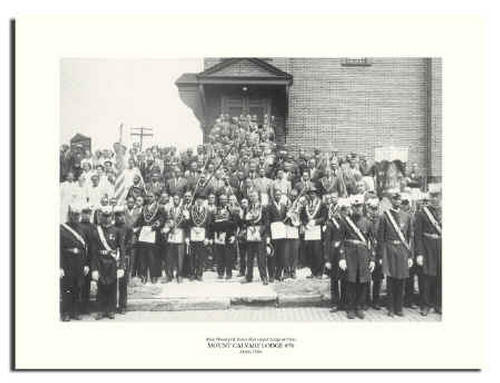
Mount Calvary Lodge No. 76 Prince Hall F & AM, is the oldest Prince Hall Lodge in the city of Akron and for 29 years from 1917-1946 it was the only one.
It became a lodge U.D. (Under Dispensation) on November 11, 1916. The following Grand Lodge officers officiated at its inception: Brothers Corey Adams - Grand Master, William Farrar - Worshipful Master, Ray E. Hughes - Senior Warden, Robert K. Stevens Jr. - Junior Warden, George P. Tytus - Treasurer, R.W. J.J. Lee - Secretary, W.D. Garnes - Senior Deacon, E.H. Sears - Junior Deacon, John L. Wilson - Senior Steward and J.R. Johnson - Tyler.
Seventeen candidates were initiated, passed and raised on the above date. They were G.F. Gross, Samuel Wilson, Levi Penn, Joseph Alexander, Julius R. Johnson, Michael O. Woolridge, Arthur McCrutcheon, William Hardy, Walter Mitchel, Charles Rideout, Nathan Scales, Jr., William Anderson, Charles R. Lewis, Charles C. Jackson, William Jefferies, J.M. Eldridge and J.A. Holloway.
After the work was completed the lodge was instituted and the following officers installed: Brothers B.H. Andrews - Worshipful Master, Nathaniel Sheldon - Senior Warden, John A. Banks - Junior Warden, M.O. Wooldridge - Treasurer, Julius R. Johnson - Secretary, Charles C. Jackson - Senior Deacon, Joseph Alexander - Junior Deacon, James A. Holloway - Chaplain, Charles R. Lewis - Senior Steward, Levi Penn - Junior Steward and G.F. Gross - Tyler.
After some delay a warrant dated August 13, 1917 was issued to the worthy brethren.
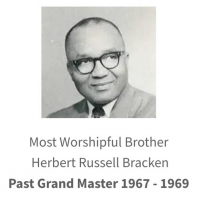
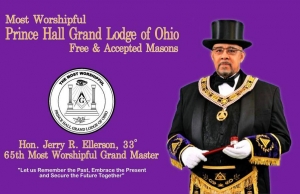
Jerry R. Ellerson was born and raised in Akron, Ohio, and graduated from North High School. In 1971 he left the University of Akron and joined the United States Army. He took his basic training at Fort Lewis in Tacoma, Washington, and advanced infantry training at Fort Ord, California. The original order he received in December of 1971 was to deploy to Vietnam; however, President Lyndon B. Johnson initiated the withdrawal of troops from Vietnam, so he was placed under new orders. He was then sent to Stuttgart, Germany, where he spent 13 months before being honorably discharged.
Bro Ellerson returned to Akron and re-enrolled at Akron University, where he me this beloved wife, Karen. Jerry and Karen were united in marriage on August 11, 1979. They currently reside in Copley, Ohio, and are proud members of Prince of Peace Missionary Baptist Church in Akron. They have two adult sons, Jared and JaVaughn. Jared, a graduate of the University of Minnesota, resides in Minneapolis, MN, with his wife Megan and their three children, Jaryn, Julian, and Jayden. JaVaughn is a graduate of Wright State University, Dayton, Ohio, and resides in Columbus, Ohio, with his daughter, Jazarah.
Bro Ellerson retired in 2011 from DuPont Performance Elastomers, where he was employed for 35 years. For the last 14 years, he served as Operations Supervisor overseeing an operational budget of 6 million dollars. Community activities included coaching Akron Area Youth sports. He coached football, basketball, and baseball for North Akron and Kenmore Community teams from 1974-1996. He is most proud of his work with these young athletes and the opportunity to coach both of his sons.
WGM Ellerson served on the Board of the Suitable Men, a social organization whose purpose was to improve the quality of life for poor, disadvantaged youth and citizens of the community, especially those in/or from North Akron. He served as President of the Suitable Men in 2006 and 2011. Scholarships were awarded to deserving graduates, and we provided opportunities to celebrate and recognized North Akron’s influences in our community.
Bro Ellerson was initiated an Entered Apprentice 2/21/1982; passed to the degree of Fellow Craft 6/20/82; and raised to the sublime degree of a Master Mason on
11/28/82 in Mt. CalvaryLodge #76, Akron, Ohio. He served Mt. Calvary Lodge as Worshipful Master in 1990. He has served as Treasurer for more than 27 years. After joining Mary Chapter #47 in 1989, he served as Worthy Patron of Mary Chapter in 1995, 1996, 1998, 1999, 2000, 2001, 2008, and 2011. He is a member of Zerubbabel Chapter #40, RAM; Golgotha Commandery #36; Enoch Council #20;Bezaleel Consistory #15; Al Kaf Temple #109. He is also elevated to Grand Inspector General of the Ohio Council of Deliberation, 33rdDegree Masons, (Joseph Fulton Class), 1999.
MWGM Ellerson has served this Grand Lodge in several capacities over the last 18 years since receiving his initial appointment as Administrative Officer of the 5th Masonic District under MWPGM Gregory S. Snead in 2003; Deputy Grand Lecturer, District #5 under MWPGM Rev. Dr. James H. Willis, Sr.,2006; Grand Lecturer under MWPGM Johnny O. Pitts in 2012. I was elected and served as Grand Trustee at Large under MWPGM Darryl R. Smith in 2013; Grand Junior Warden under Carl A. Williams in 2015; Senior Grand Warden under MWPGM Kelvin J. Davis in 2017 and Deputy Grand Master under Chester C.Christie in 2019.
Jerry R. Ellerson has the privilege of being duly elected and installed as the 65th Most Worshipful Grand Master of the Most Worshipful Prince Hall Grand Lodge of Ohio on Sunday, August 8, 2021. He is the second Grand Master elected from Mount Calvary Lodge #76 Akron, Ohio. Bro Ellerson is a firm believer in God and family first. His leisure time is spent in service and enjoying and learning the Word in my church, travel with his wife.
He loves spending time with his grandchildren, Jaryn, Jazarah, Julian, and Jayden. He also enjoys collecting rare and foreign coins and playing an occasional round of golf.

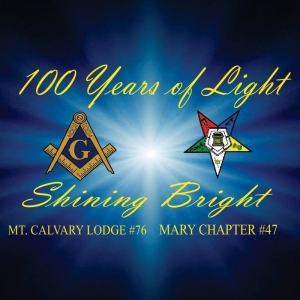
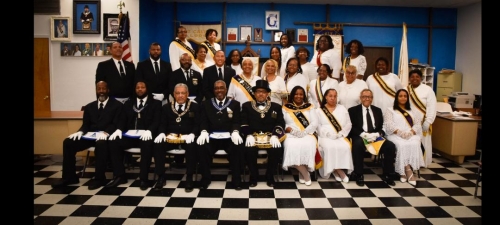


St. John The Evangelist


St. John the Baptist is considered one of the Patron Saints of Freemasonry. By history, custom, tradition and ritualistic requirements, the Craft holds in veneration the Festival Day of St.
John the Baptist on or near June 24th. Any Blue Lodge that forgets this important Festival Day forfeits a precious link with the past and loses an opportunity for the renewal of allegiance to everything in Freemasonry symbolized by this Patron Saint.
No satisfactory explanation has yet been advanced to explain why operative Masons adopted this particular Christian saint, when, for example, St. Thomas , the patron of architecture and building, was already in wide use. However, Freemasons agree that the choice was, indeed, wise. No other great teacher, wise man, or saint could have been found who better exemplified through his life and works the sublime doctrine and ageless teachings of Freemasonry.
It was a common custom in the Middle Ages for craftsmen to place themselves under the protection of some saint of the church. All the London trades appear to have ranged themselves under the banner of some saint and if possible they chose one who bore some relation to their trades Thus, for example, the fishmongers adopted St. Peter.
John had a popular ministry. It is generally thought that his ministry started when he was about the age of 27, spreading a message of repentance to the people of Jerusalem . John's ministry became so popular that many wondered if he was the Messiah prophesized in the ancient Hebrew teachings. We are also told that John the Baptist baptized Jesus after which he stepped away and told his disciples to follow Jesus. It would seem logical that these two would combine their ministries. Oddly enough, however, they apparently never met again.
Descriptions from various historical sources seem to indicate that John was a strong, handsome, well-formed man, and there is every indication that he was attractive to the opposite sex. However, we know that he never married, and chose to devote his life to his ministry.
St. John's Day, June 24, symbolically marks the summer solstice, when nature attains the zenith of light and life and joy. In John the Baptist we have a singular instance of purity, of zeal, simplicity of manners, and an ardent wish to benefit mankind by his example. To him we are indebted for the introduction of that grand tenet of our institution, which it is our glory to support: Peace on earth, good will toward men.
St. John the Baptist was a man of character and integrity, and someone we would all do well to emulate. John was a humble man, in the best sense of the word. John preached a message of repentance. Repentance means more than just saying that, "you are sorry." The Greek word "metanoia," from which the word "repentance" comes literally means, "to turn around." In other words, John urged his followers to literally turn around and move in a new direction, i.e., to move toward God instead of away from God. - mere lip service was not enough because actions speak louder than words. John wanted his followers to live lives that demonstrated their orientation toward God. Moreover, he preached this message not only with his words, but through his actions as well.
John the Baptist was simply a man who lived in one particular historical moment. Yet, his message of repentance, humility, devotion and love of God transcends time and culture. It is a message that is just as urgent and just as true today as it was 2,000 years ago. It is a message that was illustrated by John's daily life. Moreover, it is a message that underscores so many of the values that Freemasons today exalt as ideals for the living of a moral life.
We may never know the truth about John's historical relationship with Freemasonry. We may never find out if he was a member of our Fraternity, although it is highly unlikely that he was. The truth is that it really does not matter if he was a member of our Ancient Craft. Freemasonry honors the humble man who came to be known as St. John the Baptist because his entire life exemplified duty to God through his faith, his religious practices, and through the very living of his life.
The imminent Masonic scholar, Joseph Fort Newton, wrote, "Righteousness and Love -- those two words do not fall short of telling the whole duty of a man and a Freemason." And Freemasons around the world could do no better in their choice of a Patron Saint and a model for living than they have in John the Baptist - a man whose life continues to shine as an example to us all.